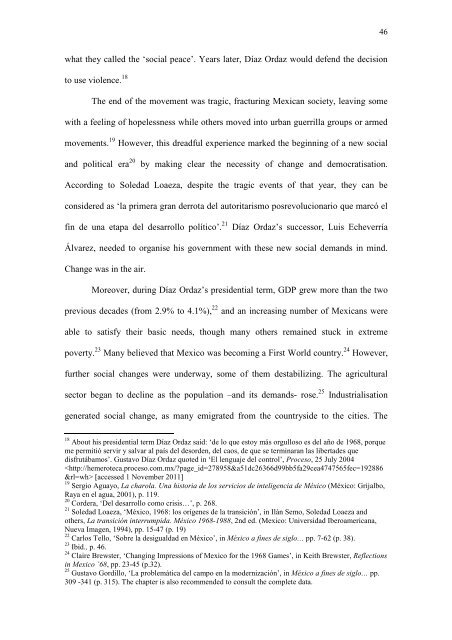Leticia Neria PhD thesis - Research@StAndrews:FullText ...
Leticia Neria PhD thesis - Research@StAndrews:FullText ...
Leticia Neria PhD thesis - Research@StAndrews:FullText ...
Create successful ePaper yourself
Turn your PDF publications into a flip-book with our unique Google optimized e-Paper software.
what they called the ‘social peace’. Years later, Díaz Ordaz would defend the decision<br />
to use violence. 18<br />
The end of the movement was tragic, fracturing Mexican society, leaving some<br />
with a feeling of hopelessness while others moved into urban guerrilla groups or armed<br />
movements. 19 However, this dreadful experience marked the beginning of a new social<br />
and political era 20 by making clear the necessity of change and democratisation.<br />
According to Soledad Loaeza, despite the tragic events of that year, they can be<br />
considered as ‘la primera gran derrota del autoritarismo posrevolucionario que marcó el<br />
fin de una etapa del desarrollo político’. 21 Díaz Ordaz’s successor, Luis Echeverría<br />
Álvarez, needed to organise his government with these new social demands in mind.<br />
Change was in the air.<br />
Moreover, during Díaz Ordaz’s presidential term, GDP grew more than the two<br />
previous decades (from 2.9% to 4.1%), 22 and an increasing number of Mexicans were<br />
able to satisfy their basic needs, though many others remained stuck in extreme<br />
poverty. 23 Many believed that Mexico was becoming a First World country. 24 However,<br />
further social changes were underway, some of them destabilizing. The agricultural<br />
sector began to decline as the population –and its demands- rose. 25 Industrialisation<br />
generated social change, as many emigrated from the countryside to the cities. The<br />
18 About his presidential term Díaz Ordaz said: ‘de lo que estoy más orgulloso es del año de 1968, porque<br />
me permitió servir y salvar al país del desorden, del caos, de que se terminaran las libertades que<br />
disfrutábamos’. Gustavo Díaz Ordaz quoted in ‘El lenguaje del control’, Proceso, 25 July 2004<br />
[accessed 1 November 2011]<br />
19 Sergio Aguayo, La charola. Una historia de los servicios de inteligencia de México (México: Grijalbo,<br />
Raya en el agua, 2001), p. 119.<br />
20<br />
Cordera, ‘Del desarrollo como crisis…’, p. 268.<br />
21<br />
Soledad Loaeza, ‘México, 1968: los orígenes de la transición’, in Ilán Semo, Soledad Loaeza and<br />
others, La transición interrumpida. México 1968-1988, 2nd ed. (Mexico: Universidad Iberoamericana,<br />
Nueva Imagen, 1994), pp. 15-47 (p. 19)<br />
22<br />
Carlos Tello, ‘Sobre la desigualdad en México’, in México a fines de siglo… pp. 7-62 (p. 38).<br />
23<br />
Ibid., p. 46.<br />
24<br />
Claire Brewster, ‘Changing Impressions of Mexico for the 1968 Games’, in Keith Brewster, Reflections<br />
in Mexico ’68, pp. 23-45 (p.32).<br />
25 Gustavo Gordillo, ‘La problemática del campo en la modernización’, in México a fines de siglo… pp.<br />
309 -341 (p. 315). The chapter is also recommended to consult the complete data.<br />
46

















